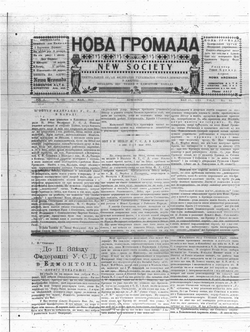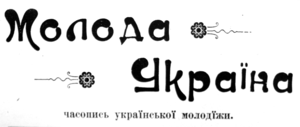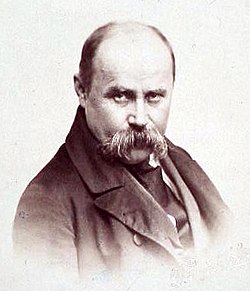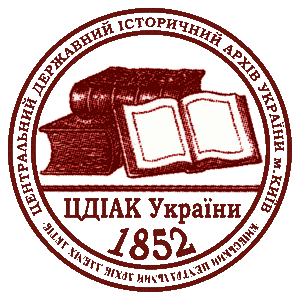
Ukrainian newspapers hold a wealth of information for genealogical researchers, offering a glimpse into the lives of ancestors and the communities they were a part of. Newspapers in Ukraine have historically covered local news and events, including births, marriages, deaths, and community gatherings. These records can be a goldmine for genealogists seeking to piece together the timelines and life events of their ancestors.
Obituaries and death notices in newspapers often provide vital information about individuals, their surviving family members, and their contributions to the community. This information can be crucial for genealogists trying to construct family trees and understand familial connections.
Community-oriented newspapers in Ukraine regularly featured announcements related to engagements, weddings, and anniversaries. Such announcements not only shed light on family relationships but also offer insights into the social fabric of the community. Newspapers also served as platforms for publishing legal notices and public records. These may include property transactions, business partnerships, and legal proceedings. Genealogists can uncover valuable details about their ancestors' professional lives and financial dealings.
In regions with diverse populations, newspapers in minority languages may provide unique perspectives on local events and individuals. Exploring newspapers in the languages spoken by your ancestors can uncover additional details that might not be present in mainstream publications.
History of the newspapers in Ukraine

The initial Ukrainian periodicals were printed using foreign languages. In 1776, the first Ukrainian weekly known as Gazette de Leopol ("Lviv Gazette") was initiated. Published in French, it delved into the political and social landscapes of the major European cities of that era. Despite its short existence of only a year, this newspaper marked the commencement of consistent Ukrainian press publications.
Even though the Austro-Hungarian Empire curtailed the advancement of national Ukrainian print media, Lviv surpassed other Ukrainian cities by several decades. Up until 1812, newspapers were exclusively printed in the western Ukrainian territories.
The revolution of 1848 eliminated censorship in Galicia, transforming Ukrainian press into a political entity. However, its primary accomplishment lay in the emergence of Ukrainian-language publications.
During the early 1800s, Kharkiv served as the cultural center of Ukraine. The "Kharkiv Weekly," printed in Russian in 1812, portrayed life in Slobozhanshchyna and covered local events. Although the publication declined within a year, it was succeeded in 1816 by the "Ukrainian Herald" and "Kharkiv Democritus," financially supported by patrons and cultural figures. Odessa and Kyiv kept pace with Kharkiv, having their own journals by the mid-1800s, with some enduring until the 1917 revolution. In the mid-19th century, the most favorable conditions for the emergence of Ukrainian-language press were in Galicia, where "Zarya Galitskaya" had been published since 1848 - the official print organ of the "Main Russian Council." In the very first issue of the weekly, it was declared that Ukrainians in the Austro-Hungarian Empire are part of the larger Ukrainian nation.
Under the influence of Poles and Polonization, in opposition to the "Main Russian Council," the "Russian Cathedral" was created, publishing "Dnevnik Russkiy" ("Russian Diary"). The publication stood out for its professionalism and featured materials with a pro-Ukrainian orientation, causing outrage within the Polish community and leading to the closure of the weekly.

The Ukrainian national movement became active in the Dnieper region in the 1840s. However, in the Russian Empire, the Ukrainian movement and press faced persecution. After the exposure and defeat of the Cyril-Mefodiyevsky Brotherhood, associated with figures like Taras Shevchenko, Panteleimon Kulish, and Nikolai Kostomarov, Ukrainians faced the sword of imperialism and harsh censorship.
The ban on Ukrainian printed words in the Dnieper region led Ukrainian public figures to emigrate to Galicia. In the subsequent decades, the Ukrainian press in western Ukraine flourished with new vigor, giving rise to humorous, religious, agricultural, legal, educational, and children's publications. At the end of the 19th century, it was precisely here that the first Ukrainian party newspapers, such as "Volya," "Lozung," "Krestyane," "Delo," and others, began to emerge.
The revolutionary struggle in the Russian Empire in 1905 created favorable conditions for the development of the Ukrainian press. One of the milestones was the October 17 Manifesto, marking the attainment of freedom of speech. Despite the continued prohibition of the Ukrainian language, the newspaper "Khleborob" emerged in 1905 in the Poltava region, becoming the first Ukrainian-language publication in the Dnieper region.
The first issue of "Khleborob" opened with the imperial manifesto, and subsequent articles were printed, discussing the rights and freedoms of the population. The newspaper called for political and economic changes, including autonomy for Ukraine within the Russian Empire. At the same time, publications like "Rodnoy Kray" and "Molodaya Ukraina" flourished in Poltava.
After the outbreak of World War I, Ukrainian cultural life and the press were banned. Military censorship prohibited Ukrainian publications in the Dnieper region, and subsequently, all Ukrainian press in Galicia was destroyed.[1]
During the Soviet period, Ukrainian newspapers were essentially tools of the state, used to propagate the ideology of the Communist Party and the Soviet government. They were tightly controlled and censored, with content being heavily influenced by the party line. The most prominent newspaper was Pravda, which had a Ukrainian edition and served as the official mouthpiece of the Communist Party. It presented a skewed version of reality, requiring readers to read between the lines to discern the truth.
Ukrainska Pravda, founded in 2000 by Georgy Gongadze, was a significant development in Ukrainian journalism, as it aimed to provide independent and uncensored news. However, its impact was felt after the Soviet period, during Ukraine's independence.
Overall, Ukrainian newspapers in the Soviet period were not independent sources of information but rather instruments of state propaganda and control. It was only after the dissolution of the Soviet Union that independent journalism began to flourish in Ukraine.
How to find newspaper records in Ukraine

Finding newspaper records in Ukraine for genealogical research involves exploring various archives, libraries, and online platforms. Here are some general guidance and potential sources to help you in your search:
- State Archives of Ukraineis a primary repository for historical records, including newspapers. You can visit their website or contact them directly to inquire about the availability of newspaper records.
- National Library of Ukrainein Kyiv is another important institution that may house newspaper archives. Check their catalog and contact the library for information on accessing historical newspapers.
- Regional Archives and Libraries: Different regions in Ukraine may have local archives and libraries with collections of historical newspapers. Consider researching archives in the specific regions where your ancestors lived. Local archives or libraries may have information about their holdings on their official websites.
See also
Find newspapers records for your genealogical research
Explore more about newspaper records in Ukraine
- Beginning Ukrainian Genealogy at Legacy Family Tree Webinars
- Newspaper collection at MyHeritage
- Historical records from Ukraine at MyHeritage
- Newspaper Research Strategies Using MyHeritage on the MyHeritage Knowledge Base
- How to Find Your Family in Newspapers with SuperSearch on the MyHeritage Knowledge Base
- Importance of Newspapers for Family Research on the MyHeritage Knowledge Base
- Mining the Newspaper Databases on MyHeritage for Your Family History on the MyHeritage Knowledge Base
References
<link rel="mw:PageProp/Category" href="./Category:Ukraine" />